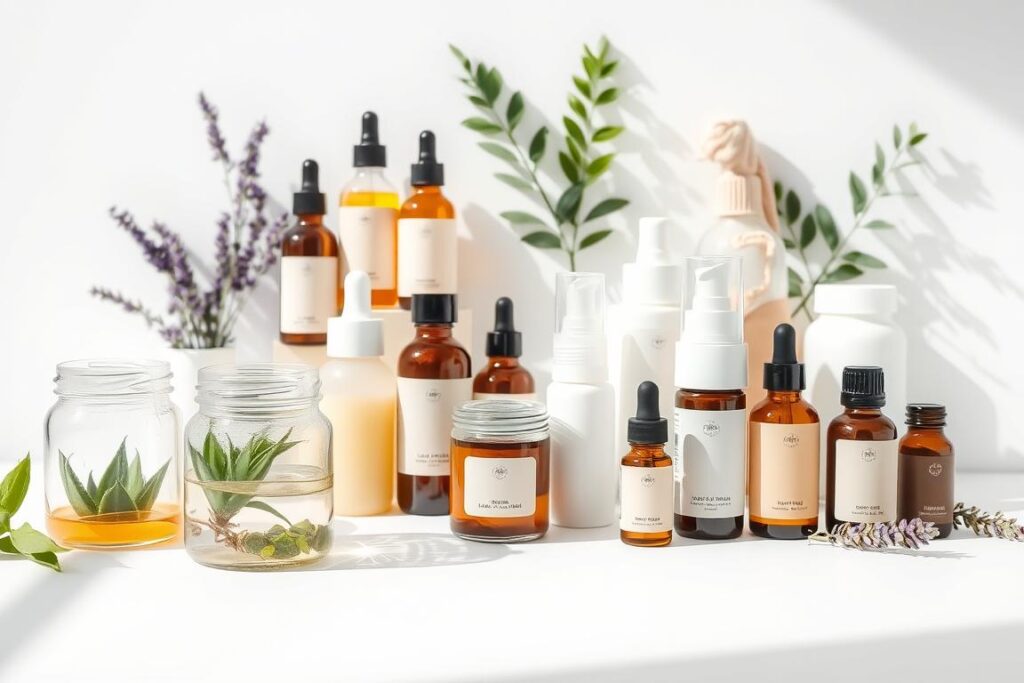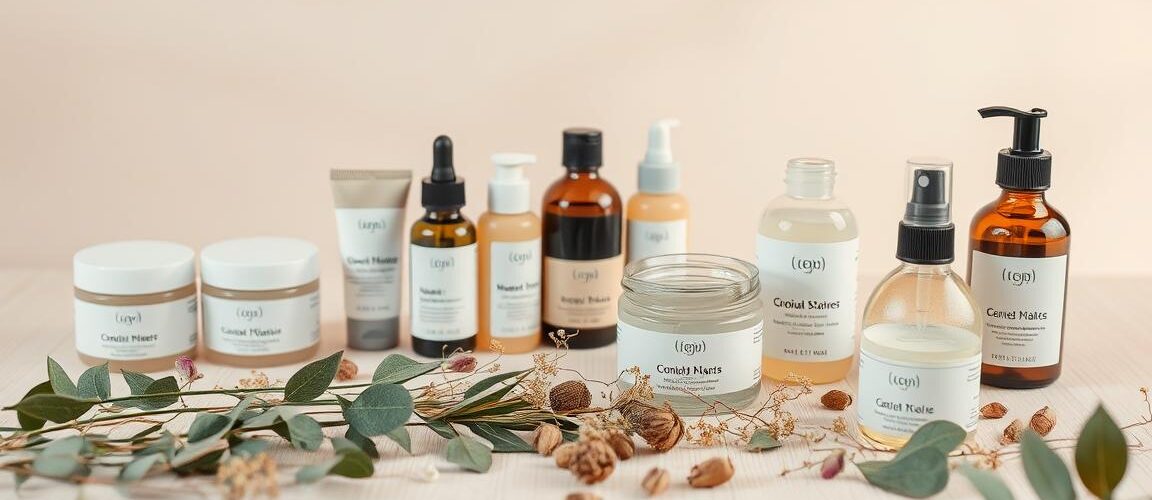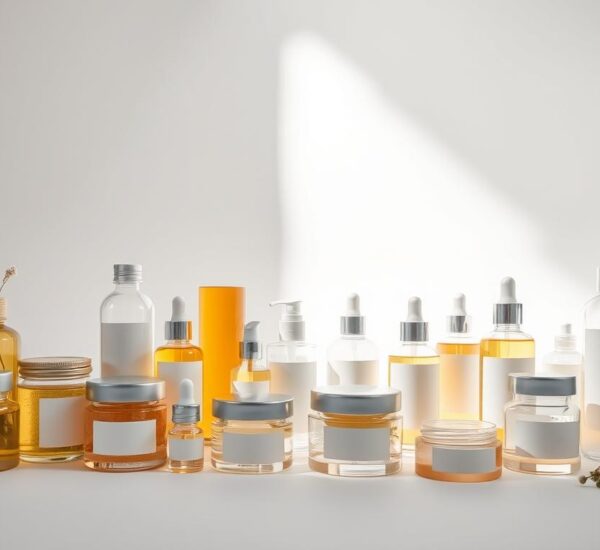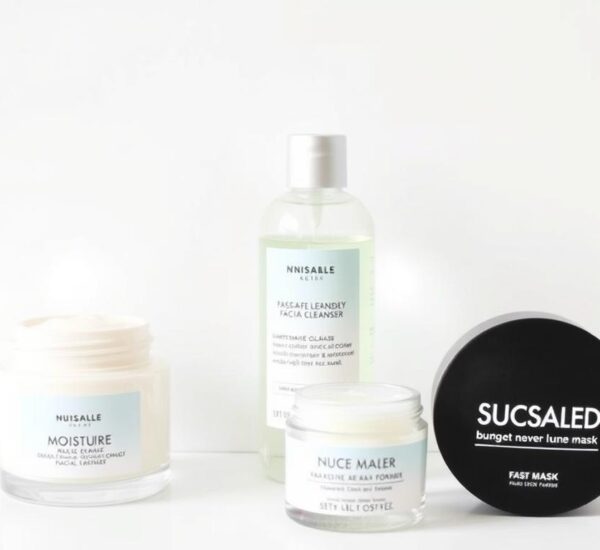We think that getting a glowing and young look starts with nourishing our skin with the best products. COOLA says a healthy skin barrier is our first defense against bad stuff from the environment and digital stress.
By picking natural beauty products, we shield our skin from harsh chemicals and environmental stress. GARA shows how important it is to use eco-friendly skincare that’s kind to our skin.
Key Takeaways
- Using natural ingredients can help protect your skin.
- Eco-friendly products are gentler on your skin.
- A healthy skin barrier is key for good skin health.
- Organic skincare products can make your skin glow.
- Choosing the right products is essential for a youthful look.
What is Organic Skincare?
The term ‘organic skincare’ has become popular. But what does it mean? It’s about using natural and organic ingredients in skincare products. It means avoiding harsh chemicals and synthetic fragrances.
Organic skincare, as defined by GARA, uses plant-based, locally sourced, and 100% organic ingredients. This makes the products gentle on the skin and supports sustainable practices.
Definition and Principles
At its core, organic skincare is about a non-toxic and clean beauty approach. It focuses on using ingredients from nature, which are biodegradable. These ingredients are made without harmful chemicals or processes.
This means organic skincare products don’t have parabens, sulfates, or artificial fragrances. These can irritate the skin and harm the environment. Instead, they have nourishing ingredients that help keep the skin healthy.
Benefits of Organic Ingredients
Using organic ingredients in skincare has many benefits. They are gentler on the skin, reducing irritation and allergic reactions. This makes them great for sensitive skin types.
Organic ingredients are also full of antioxidants and nutrients that boost skin health. For example, organic oils like coconut and olive oil moisturize the skin. Plant extracts, like aloe vera, soothe and calm it.
Choosing organic skincare means adopting a sustainable skincare routine. It benefits your skin and helps the environment.
The Importance of Choosing Organic
Choosing organic skincare is more than a trend. It’s a big step towards a healthier life and a greener planet. It benefits our skin and the environment in many ways.
Environmental Impact
Organic skincare helps reduce the beauty industry’s environmental harm. COOLA, a brand focused on eco-friendliness, says organic products are key to a sustainable future. Conventional skincare often pollutes and wastes, but organic skincare uses sustainable ingredients and methods.
Eco-friendly skincare goes beyond ingredients. It’s about sustainable packaging, minimal waste, and eco-conscious manufacturing. By picking these products, we help make the beauty industry greener.
Skin Health and Safety
Organic skincare is good for the planet and our skin. It uses natural, organic ingredients that are safe and effective. This means less risk of skin irritation and other problems.
For those with sensitive skin, cruelty-free skincare and organic options are vital. GARA says organic skincare avoids harsh chemicals that can irritate the skin. It nourishes and protects without the dangers of chemical products.
Choosing organic skincare means a safe and effective routine. It’s a big step towards healthy, strong skin while helping the environment.
Key Ingredients in Organic Skincare
Knowing the key ingredients in organic skincare is key to making smart choices. Organic skincare uses natural, non-toxic ingredients. These ingredients are good for your skin and the planet.
Essential Oils and Their Benefits
Essential oils are a big part of organic skincare. Oils like chamomile and lavender are known for soothing and reducing inflammation. Chamomile oil calms irritated skin, while lavender oil helps with stress-related skin issues.
- Tea Tree Oil: It fights acne-causing bacteria.
- Frankincense Oil: It helps reduce wrinkles and fine lines.
- Geranium Oil: It balances hormones and improves skin elasticity.
Natural Extracts to Look For
Natural extracts are vital in organic skincare. They offer hydration and anti-aging benefits. Aloe vera, green tea, and rosehip extracts are favorites.
| Extract | Benefits |
|---|---|
| Aloe Vera | Hydrates and soothes the skin, reducing inflammation. |
| Green Tea | It’s full of antioxidants, protecting the skin from harm. |
| Rosehip | It helps regenerate skin and improve texture. |
Avoiding Harmful Chemicals
Organic skincare avoids harmful chemicals and synthetic fragrances. Parabens, sulfates, and phthalates can harm your skin and the environment. Choosing organic skincare means avoiding these bad substances.
When buying organic skincare, always check the labels. Look for certifications that show the product is organic. This keeps your skin safe and supports the planet.
How Organic Skincare Differs from Conventional Products
More and more people are thinking about what they put on their skin. They’re looking into the difference between organic and conventional skincare. Organic skincare is all about clean beauty and sustainable skincare.
Ingredient Transparency
Organic skincare uses natural and organic ingredients. It avoids harmful chemicals. This is good for your skin and the planet.
With organic skincare, you know what’s in your products. A study by COOLA showed organic products have clear labels. This helps you avoid things that might irritate your skin.
Efficacy and Results
Organic skincare isn’t just gentle; it works well. Brands like GARA use top-notch, natural ingredients. They’re safe and effective for your skin.
| Feature | Organic Skincare | Conventional Skincare |
|---|---|---|
| Ingredient Transparency | Clear labeling of natural and organic ingredients | May contain undisclosed chemicals |
| Efficacy | Designed to be effective with natural ingredients | May use harsh chemicals for immediate results |
| Environmental Impact | Eco-friendly practices and sustainable sourcing | Potential for pollution and environmental harm |

Popular Organic Skincare Brands to Consider
Looking for top-notch organic skincare? There are many brands that focus on being green and effective. The organic skincare market has a wide range of products for all skin types and needs.
Brand Spotlight: Tata Harper
Tata Harper is all about making products that are good for your skin and the planet. They offer a variety of items, like regenerating cleansers and nourishing moisturizers, all organic.
The brand is serious about being eco-friendly. They avoid harsh chemicals, making their products safe for sensitive skin.
Brand Spotlight: Dr. Hauschka
Dr. Hauschka is known for its natural approach to skincare. They use natural ingredients to help your skin stay balanced.
Dr. Hauschka’s products, like cleansers and creams, work with your skin’s natural processes. They use organic and biodynamic ingredients for quality and effectiveness.
Brand Spotlight: 100% Pure
100% Pure stands by its name, using only natural ingredients. Their line includes fruit-pigmented masks and antioxidant serums for visible results without harming your skin.
The brand also cares about the planet, using eco-friendly packaging and responsible sourcing.
| Brand | Key Features | Product Highlights |
|---|---|---|
| Tata Harper | Sustainable, organic ingredients, safe for sensitive skin | Regenerating cleanser, nourishing moisturizer |
| Dr. Hauschka | Holistic approach, natural ingredients, promotes skin balance | Cleansers, toners, creams |
| 100% Pure | 100% natural ingredients, eco-friendly packaging | Fruit-pigmented masks, antioxidant serums |
When picking an organic skincare brand, think about more than just ingredients and how well they work. Look at the brand’s commitment to being green and caring for the environment. The brands mentioned above are dedicated to these values, making them great choices for organic skincare.
Customizing Your Organic Skincare Routine
Creating an effective organic skincare routine starts with knowing your skin type. This helps you pick non-toxic skincare products that meet your skin’s specific needs. Whether it’s dryness, sensitivity, or acne, you can find the right products.
Assessing Your Skin Type
Figuring out your skin type is the first step. Skin types include normal, dry, oily, combination, or sensitive. Watch how your skin acts during the day to find out yours.
If your skin feels tight and dry, it’s likely dry. If it’s oily, it might be shiny, mainly on the T-zone. Knowing your skin type helps you choose the right products.
For dry skin, look for moisturizers with natural emollients. If you have oily skin, choose lightweight, oil-free products to avoid clogged pores.
Tailoring Products to Your Needs
After figuring out your skin type, pick clean beauty products that fit your needs. For dry skin, use products with aloe vera and shea butter. For oily skin, tea tree oil or witch hazel can help.
Choosing sustainable skincare is good for your skin and the planet. Look for eco-friendly packaging and brands that care about the environment. This way, you can help the planet while improving your skin.
In summary, making your organic skincare routine is about more than just picking products. It’s about creating a routine that fits your skin’s needs. By choosing the right products, you can enjoy the benefits of non-toxic skincare and clean beauty. This leads to healthier, more radiant skin.
The Role of Diet in Skin Health
Our skin shows our overall health. Eating well is key to having healthy, glowing skin. Foods rich in nutrients help our skin and make organic skincare work better. Choosing the right foods supports our skin’s health and makes our skin look great.
Foods for Healthy Skin
Some foods are great for our skin. Leafy greens like spinach and kale are full of antioxidants. These protect our skin and help it stay firm. Berries, like blueberries and raspberries, are also good because they have vitamins A and C. These vitamins help our skin stay elastic and look younger.
Fatty fish and avocados are also good for our skin. They have healthy fats and vitamin E. Nuts and seeds, like almonds and sunflower seeds, are full of vitamin E and antioxidants. They’re a tasty snack for healthy skin.
- Leafy greens like spinach and kale
- Berries such as blueberries and raspberries
- Fatty fish rich in omega-3 fatty acids
- Avocados providing healthy fats and vitamin E
- Nuts and seeds like almonds and sunflower seeds
Supplements for Skin Support
Some supplements can also help our skin. Omega-3 fatty acids in fish oil supplements reduce inflammation. Probiotics support a healthy gut, which is good for our skin.
Vitamin D and zinc are also good for our skin. Vitamin D helps our skin cells grow and work right. Zinc helps our skin heal and reduces inflammation. Always talk to a doctor before taking any supplements.
| Supplement | Benefit |
|---|---|
| Omega-3 fatty acids | Reduces inflammation, promotes healthy skin |
| Probiotics | Supports gut health, reduces inflammation |
| Vitamin D | Essential for skin cell growth and differentiation |
| Zinc | Supports wound healing, reduces inflammation |
By eating well and using organic skincare, we can get healthy, glowing skin. A balanced diet and organic skincare together show our overall health. This holistic approach is the best way to get great results.
Sustainable Packaging in Organic Skincare
The move towards eco-friendly practices in organic skincare goes beyond just ingredients. As people become more aware of the environment, they want products with sustainable packaging. This is a big trend in the green beauty world.
Brands are now choosing packaging that can be recycled, reused, or breaks down naturally. This change helps cut down on waste. It also fits with the idea of cruelty-free skincare and caring for the planet, making beauty more complete.

Eco-Friendly Practices
Using eco-friendly packaging means a few key things. It includes using less packaging, picking materials that are good for the planet, and making packaging that can be recycled or reused. Brands focused on green beauty are leading the way, setting new standards.
- Minimal and optimized packaging designs
- Use of recycled and recyclable materials
- Innovative packaging solutions that are biodegradable
These steps help make the skincare industry less harmful to the environment. They also win over customers who care about sustainability when they shop.
Importance of Recycling
Recycling is key for packaging. Choosing products with recyclable packaging helps cut down on waste. It also saves resources, reduces landfill waste, and lowers emissions from making new stuff.
We urge people to back brands that focus on eco-friendly skincare and sustainable packaging. By doing this, we can make the beauty world better for our planet and future generations.
DIY Organic Skincare Recipes
DIY organic skincare recipes let you tailor your skincare to your needs. You can use natural ingredients to make products that fit your skin type.
Bradceuticals says making your own skincare is fun and effective. GARA also stresses the importance of natural ingredients. Let’s look at some easy recipes for masks, scrubs, and lip balms you can make at home.
Simple Facial Masks
Facial masks are great for pampering and solving skin problems. Here are a few easy recipes:
- Turmeric and Honey Mask: Mix 1 teaspoon of turmeric powder with 2 tablespoons of honey. It’s a soothing mask that fights inflammation.
- Oatmeal and Yogurt Mask: Combine 2 tablespoons of oatmeal with 1 tablespoon of yogurt. It’s calming and moisturizing.
Hydrating Body Scrubs
Body scrubs exfoliate, revealing smoother skin. Here are some recipes:
- Sugar and Coconut Oil Scrub: Mix 1 cup of sugar with 1/2 cup of coconut oil and a few drops of your favorite essential oil. It’s nourishing.
- Salt and Olive Oil Scrub: Combine 1 cup of salt with 1/2 cup of olive oil. It’s detoxifying.
For more tips on balancing your skin’s pH, check out our guide on using apple cider vinegar toner for oily skin.
Natural Lip Balms
It’s important to keep your lips moisturized, even in harsh weather. Here’s a simple recipe:
- Coconut Oil and Beeswax Lip Balm: Mix 2 tablespoons of coconut oil with 1 tablespoon of beeswax and a few drops of vitamin E oil. It’s nourishing.
| Recipe | Key Ingredients | Benefits |
|---|---|---|
| Turmeric and Honey Mask | Turmeric, Honey | Reduces inflammation, moisturizes |
| Sugar and Coconut Oil Scrub | Sugar, Coconut Oil | Exfoliates, nourishes |
| Coconut Oil and Beeswax Lip Balm | Coconut Oil, Beeswax | Moisturizes, protects |
Real Stories: Transformations with Organic Skincare
The power of organic skincare is shown in real-life stories. Many have seen big improvements in their skin health by using clean beauty and sustainable skincare.
Testimonials from Users
People using organic skincare products have seen amazing changes. A study by COOLA found many people had healthier, brighter skin. One user said, “Switching to organic skincare changed my game. My sensitive skin has never looked or felt better.”
Another user said, “I struggled with acne for years. But eco-friendly skincare products solved my problem. Now, my skin is clearer than ever.”
Before and After Comparisons
Organic skincare’s effectiveness is clear in before and after photos. Here are some examples:
| Skin Concern | Before | After |
|---|---|---|
| Acne | Frequent breakouts | Significant reduction in acne |
| Dryness | Dull, dry skin | Hydrated, glowing skin |
| Sensitivity | Redness and irritation | Calmed, soothed skin |
These changes show how organic skincare can greatly improve skin health. By choosing sustainable skincare, people can also help the environment.
Future Trends in Organic Skincare
The organic skincare industry is set for big growth and new ideas. More people want organic skincare and natural beauty products. They’re looking for green beauty options.
Brands are now focusing on being more sustainable. They’re using eco-friendly packaging and getting ingredients responsibly.
Innovations to Watch
Organic skincare’s future is exciting. Here are some trends to keep an eye on:
- Plant-based ingredients that are good for the planet and work well.
- Microbiome-friendly products that help keep the skin healthy.
- Personalized skincare that fits each person’s skin needs.
These new ideas will change how we take care of our skin. They’ll make skincare more personal and effective.
| Innovation | Description | Benefits |
|---|---|---|
| Plant-based Ingredients | These ingredients come from nature and are kind to the skin. | They’re good for the planet, work well, and are gentle. |
| Microbiome-friendly Products | These products help keep the skin’s natural balance. | They make the skin healthy, reduce irritation. |
| Personalized Skincare | Skincare made just for you, based on your skin type and needs. | It’s more effective because it meets your specific needs. |
Shifts in Consumer Preferences
People now want products that are good for the planet and work well. They want to know what’s in their products and where it comes from.
They also want products that match their values, like cruelty-free and vegan. Brands that listen to these needs will do well in the future.
Conclusion: Embrace Organic for Healthy Skin
Switching to organic skincare is a big step towards better skin. It’s not just good for your skin but also for the planet. Choosing eco-friendly products helps us all.
Our journey to better skin is personal and never-ending. Going organic means avoiding harsh chemicals and synthetic smells. This helps our skin stay healthy. Brands like COOLA and GARA lead the way with their natural and green products.
Make the Switch to Organic Skincare
We urge you to keep exploring organic skincare. Find what works best for your skin. The benefits of natural ingredients and green packaging make the change worth it.
Start Your Journey Today
Adding organic skincare to your daily routine is a smart move. It’s a step towards glowing, healthy skin. Join the many who’ve already switched to organic. Together, we can make beauty more natural and sustainable.



